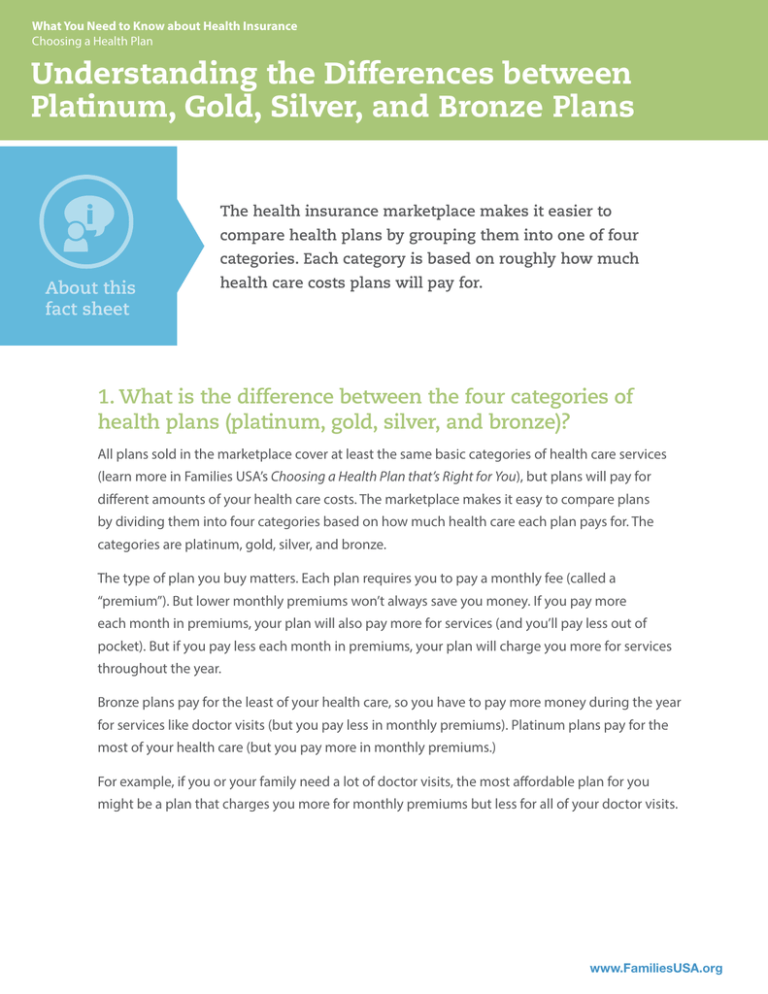Understanding the Differences between Platinum, Gold, Silver, and
advertisement

What You Need to Know about Health Insurance Choosing a Health Plan Understanding the Differences between Platinum, Gold, Silver, and Bronze Plans The health insurance marketplace makes it easier to compare health plans by grouping them into one of four categories. Each category is based on roughly how much About this fact sheet health care costs plans will pay for. 1. What is the difference between the four categories of health plans (platinum, gold, silver, and bronze)? All plans sold in the marketplace cover at least the same basic categories of health care services (learn more in Families USA’s Choosing a Health Plan that’s Right for You), but plans will pay for different amounts of your health care costs. The marketplace makes it easy to compare plans by dividing them into four categories based on how much health care each plan pays for. The categories are platinum, gold, silver, and bronze. The type of plan you buy matters. Each plan requires you to pay a monthly fee (called a “premium”). But lower monthly premiums won’t always save you money. If you pay more each month in premiums, your plan will also pay more for services (and you’ll pay less out of pocket). But if you pay less each month in premiums, your plan will charge you more for services throughout the year. Bronze plans pay for the least of your health care, so you have to pay more money during the year for services like doctor visits (but you pay less in monthly premiums). Platinum plans pay for the most of your health care (but you pay more in monthly premiums.) For example, if you or your family need a lot of doctor visits, the most affordable plan for you might be a plan that charges you more for monthly premiums but less for all of your doctor visits. www.FamiliesUSA.org Understanding the Differences between Platinum, Gold, Silver, and Bronze Plans What else will I need to pay for in addition to my monthly fees (premiums)? Out-of-Pocket Costs Deductible: Before your plan begins to pay for your health care costs (for example, a hospital stay), it requires you to pay a certain amount of money first—called a “deductible.” Once you have paid that amount, the plan begins to pay for many of your health care costs. Copayments/Co-Insurance: You usually pay a part of each health care service that you receive (like seeing a doctor), even after you have paid your deductible. These payments are called copayments or co-insurance. Copayments are a set dollar amount that you pay each time you receive a service (for example, a $20 fee for each doctor’s visit). Co-insurance is a part of the cost for a service that you must pay. For example, 20 percent co-insurance for a hospital visit means that you must pay 20 percent of the total cost of your hospital visit. Out-of-Pocket Limit: This is the most you could pay for care in a year, adding up your deductible, copayments, and coinsurance payments. Once you have paid that amount, your plan will pay the full cost of all of your covered health care services for the rest of the year. PLAN CATEGORIES Category Platinum (highest monthly premiums) Level of Coverage Pays for about 90% of medical care costs Gold Pays for about 80% of medical care costs Silver Pays for about 70% of medical care costs Bronze (lowest monthly premiums) Pays for about 60% of medical care costs Remember that each category of health plans (platinum, gold, silver, and bronze) only tells you the average amount of health care costs that the plan will pay. A plan may pay more or less of your costs, depending on how much care you need. 2 WHAT YOU NEED TO KNOW ABOUT HEALTH INSURANCE Understanding the Differences between Platinum, Gold, Silver, and Bronze Plans HEALTH INSURANCE PLANS & LEVELS OF COVERAGE The marketplace makes it easy to compare plans by dividing them into four categories: platinum, gold, silver, and bronze. The category tells you how much your premiums will cost and how much health care your plan will pay for. If you pay more in premiums, the plan will pay more of your covered health care expenses. Your plan pays more PLATINUM How much of your covered health care expenses are paid by your insurance plan GOLD SILVER Your plan pays less BRONZE Low premium How much you pay for your monthly premium High premium 2. How do I compare specific plans? Use the categories of plans to help you compare ballpark costs. MORE INFORMATION Once you choose a category, compare plans based on these To learn more about how to factors to make sure you pick a plan that covers the health care compare plans based on their services you need at a price you can afford: costs, benefits, and which doctors costs that you’ll need to pay for out of your own pocket, such as monthly premiums, deductibles, copayments, and co-insurance and providers you can visit, see Families USA’s Choosing a Health Plan You Can Afford and Choosing costs for specific services and medicines which doctors and providers accept the plan’s insurance rules about whether you need referrals from a primary care provider to see specialists a Health Plan that’s Right for You. www.FamiliesUSA.org 3 3. If I get financial assistance to help pay for my monthly health insurance premiums, can I buy a plan in any category? You can pay for a plan in any category with the financial assistance that you receive. The amount of financial assistance that you get is based on your income and how much money you’d need to pay for a silver plan. You will get the same amount of financial assistance no matter CATASTROPHIC COVERAGE Marketplaces also sell “catastrophic” health plans. These are plans that pay for even less of your health care costs than bronze plans, but have very low monthly premiums. However, not everyone is allowed to buy these plans. which plan you pick. So if you choose a more expensive plan, you will need to pay more each month. If you choose a less expensive plan, you will have to pay less each month. 4. If I get extra financial help with paying out-of-pocket costs for care, can I buy a plan in any category? No. Most people who get extra financial help with paying out-of-pocket costs, like deductibles and copayments, must buy a silver plan to get this help. The extra financial help will allow you to pay the lower monthly premiums for a silver plan, but you will have lower out-of-pocket costs. Depending on the amount of help you qualify for, your out-of-pocket costs could be as low as what you would have to pay for care in a gold or platinum plan. 1201 New York Avenue NW, Suite 1100 Washington, DC 20005 202-628-3030 info@familiesusa.org | www.FamiliesUSA.org © Families USA 2013




